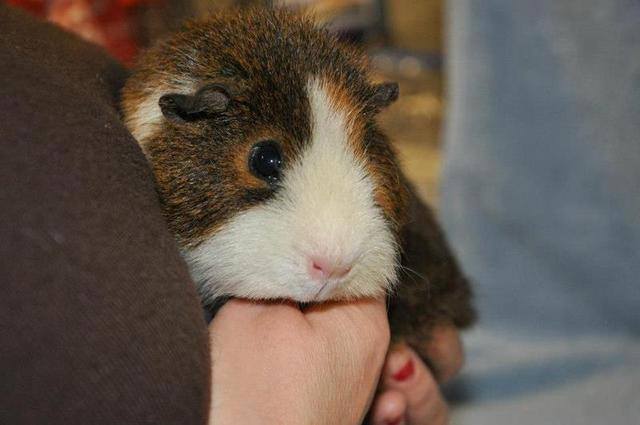First Aid For Guinea Pigs

Please Note
Please be aware that a competent veterinary diagnosis and advice is extremely important, whether you use anything in your first aid kit or not. Please make sure you have registered with a good vet - don't wait until you actually need the vet to find out whether s/he is experienced enough in guinea pig medical care to save your guinea.
Useful TOOLS in a Guinea Pig First Aid Kit
1ml syringes / 5ml syringes
Pill crusher (pestle and mortar)
Pill cutter
Weighing Scales
Small bowls and spoons
Rodent-safe heatpad
Nail clippers
Tweezers
Round-ended scissors
Towels (hand-towel or tea-towel size)
Kitchen Roll
Cotton wool pads
Cotton buds
Gauze
Soft, flexible wrap bandages
Disposable gloves
Useful SUPPLEMENT
- Vitamin c
Used for: All poorly piggies.
Example Products: Tesco Chewable Vitamin C 200mg, Oxbow Daily C.
Ill guineas need a minimum of 50-100mg Vitamin C a day. Especially if they are not interested in eating, supplementing is well worthwhile. Find a Vitamin C supplement with as low a dose as possible to allow you to dose accurately.
- Syringe-feeding formula
Used for: Guineas who are not eating normally.
Please do not attempt to syringe-feed your guinea pig if s/he is bloated; a blockage must be ruled out urgently to allow safe and appropriate treatment and feeding to commence.
Example Products: Oxbow Critical Care, Science Recovery.
A guinea who is not eating at all will need feeding little and often, amounting to an absolute total minimum of 60-120ml per day. It is also appropriate to soak and mash your guineas normal plain pellet feeds (e.g. Burgess Excel, Science Selective, Wagg Optimum etc.).
- Probiotic
Used for: Piggies with digestive upsets, particularly diarrhoea; Piggies on antibiotics.
Example Products: Protexin Bio-Lapis, Fibreplex, Pro-C Probiotic, Avipro Plus.
Acidophilus powder or “poop soup” (faeces from a healthy pig mashed and mixed with a little water) are just as adequate. If giving a probiotic alongside antibiotics, leave 1-2 hours after the antibiotic dose before giving the probiotic.
- Saline
Used for: Cleansing and flushing a variety of wounds.
- Ear Drops
Used for: Cleaning the ears, which can help to prevent ear mites.
Example Products: Otodex Veterinary Ear Drops (for cats and dogs), Johnson’s Ear Drops.
Apply 2-3 drops to the folds of each ear, massage in well, and leave for up to 24 hours to soften the ear wax. Using a flannel or cotton bud, gently cleanse out the visible flaps and folds of the ear. An alternative product to use is 2-3 drops of mineral oil.
- Rehydration Solution
Used for: Rehydrating guineas suffering diarrhea and mild heatstroke.
Example Products: Dioralyte (plain or blackcurrent flavour).
In the early stages of dehydration, or in cases where the guinea is not getting any water from either food or drink, such a preparation can be preferable to plain water. Rehydration solutions are vastly preferable to plain water as the conditions warranting its use lead to depletion in electrolytes. Mix up the solution as directed, then syringe as much as possible frequently (e.g. 10ml every 2-3 hours). However, never attempt to syringe anything into your guinea if he is too weak or listless to stand or to hold his head up – seek urgent veterinary assistance
Antibiotic general advice
Ensure antibotic courses are completed ! Give your Guinea Pig pro-biotics whilst on antibiotics and for two weeks after.This will help protect Gut motility,which can be affected by anti-biotics. 1ml syringes are best for easy dosin
Give vit c 10mg / kg whilst on antibiotics to help boost immune system.Drops are ok but tablets ensure you know its been given !! My Guinea Pigs take relevant doses in little pieces of cabbage
Calculation for tablet dosage.
what you want divided by what you have x volume of syringe
For example you have 200mg vit c tablet but you need to give 25mg dose and you have a 10ml syringe of water.
what you want = x volume 10ml = 1.25ml in a 1ml syringe
what you have
You can use this method for other medicines and doses.
